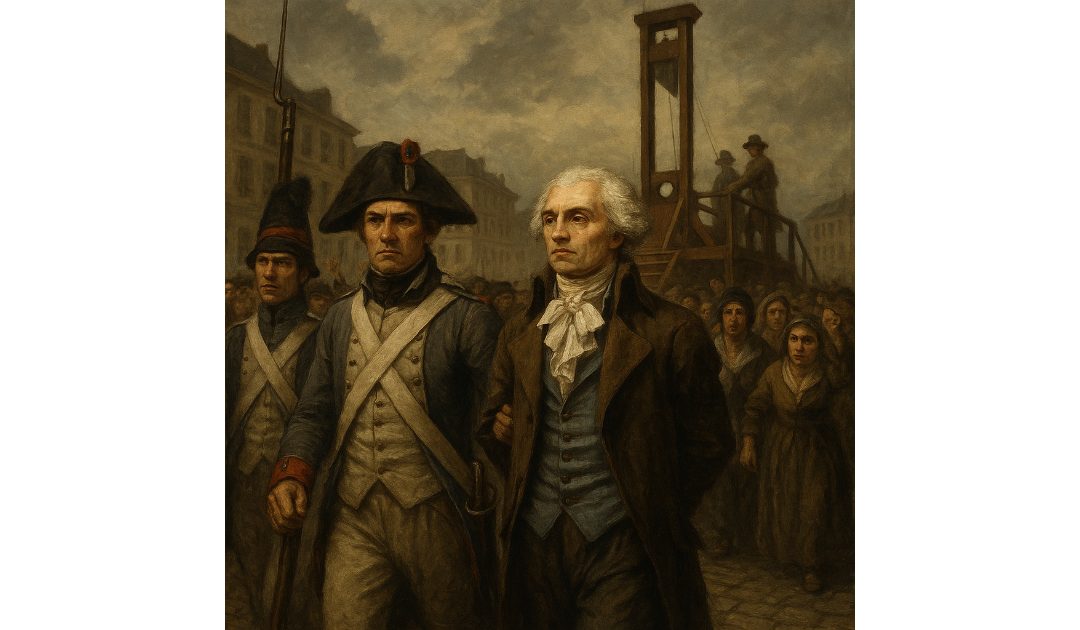I am working on the second draft of The Favourite Murder, the fifth book in the Sir Anthony Standen Adventures. It is set in Paris around 1612 to 1614, and the Estates-General of 1614 features. Perhaps that is why the execution of Robespierre by guillotine on the 28th of July 1794 caught my eye today.
Maximilien Robespierre, a pivotal figure in the French Revolution, was born on the 6th of May, 1758 in Arras, France. His life and political career were marked by his unwavering dedication to the principles of liberty, equality, and fraternity, which would both elevate him to the heights of revolutionary leadership and contribute to his dramatic downfall.
Robespierre came from a family of lawyers, and his own legal acumen was evident early on. He studied at the prestigious Lycée Louis-le-Grand in Paris, where he excelled academically, eventually pursuing law at the University of Paris. His education exposed him to Enlightenment thinkers such as Rousseau, whose philosophy profoundly influenced Robespierre’s ideals, particularly the emphasis on virtue and the general will of the people.
Entering the political arena during the Estates-General of 1789, Robespierre quickly distinguished himself as a member of the Third Estate, representing the common people. A gifted orator, he championed democratic reforms, universal male suffrage, and the abolition of the death penalty—ironically, a stance he would later abandon. His commitment to social justice earned him the nickname “The Incorruptible,” highlighting his perceived moral integrity and dedication to the revolutionary cause.
As the Revolution intensified, Robespierre became a leading figure in the Jacobin Club, an influential political group advocating for radical change. His persuasive speeches and ideological fervour galvanised support among the sans-culottes, the working-class revolutionaries who sought to dismantle the ancien régime. Robespierre’s vision for a republic rooted in virtue and equality resonated with many who felt disenfranchised by the old order.
Robespierre’s ascent to power culminated during the Reign of Terror (1793–1794), a period marked by political purges, mass executions, and the ruthless suppression of perceived enemies of the Revolution. As a key member of the Committee of Public Safety, he wielded immense authority, justifying the use of terror as a means to protect the Revolution and achieve a “Republic of Virtue.” Under his leadership, the guillotine became a symbol of revolutionary justice, claiming the lives of thousands, including King Louis XVI and Queen Marie Antoinette.
Despite his initial opposition to capital punishment, Robespierre argued that terror was a necessary instrument to defend the Revolution from both internal and external threats. He believed that only through the eradication of corruption and counter-revolutionary elements could true equality and liberty be realised. His unwavering belief in his moral righteousness led to increasingly autocratic tendencies, alienating former allies and fostering an atmosphere of fear and suspicion.
Robespierre’s downfall was precipitated by his growing isolation and the mounting opposition within the National Convention. Critics accused him of tyranny, and his relentless purges even targeted prominent revolutionaries who once stood by his side. The turning point came in July 1794, during the event known as the Thermidorian Reaction. Fearing for their own lives, members of the Convention conspired against him. On the 27th of July 1794 (9 Thermidor), Robespierre was arrested along with his closest allies. The following day, he was executed by guillotine without trial, a victim of the very machinery of terror he had championed.
Robespierre’s legacy is complex and polarising. To some, he remains a symbol of integrity and revolutionary zeal, a man who sought to create a just society rooted in egalitarian principles. To others, he embodies the dangers of ideological extremism and the moral compromises made in the pursuit of utopian ideals. His life prompts enduring questions about the balance between security and liberty, the ethics of revolutionary justice, and the corrupting nature of power.
In the broader context of history, Robespierre’s influence extends beyond the French Revolution. His ideas on democracy, governance, and social justice have inspired political movements worldwide. Yet, his story also serves as a cautionary tale about the perils of dogmatism and the tragic consequences when ideology supersedes humanity. His rise and fall encapsulate the contradictions of the Revolution itself—a struggle for freedom that often resorted to oppression, a quest for equality marred by violence and exclusion.
Maximilien Robespierre’s life and legacy continue to captivate historians, political theorists, and the public alike. His commitment to his ideals, his role in shaping modern political thought, and the dramatic arc of his revolutionary career offer profound insights into the complexities of human nature and the enduring challenges of creating a just society.

